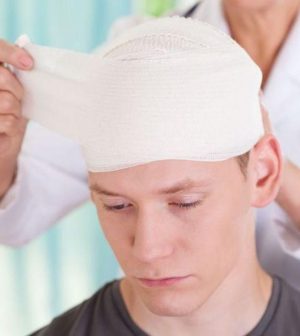- 10 Strategies to Overcome Insomnia
- Could Artificial Sweeteners Be Aging the Brain Faster?
- Techniques for Soothing Your Nervous System
- Does the Water in Your House Smell Funny? Here’s Why
- Can a Daily Dose of Apple Cider Vinegar Actually Aid Weight Loss?
- 6 Health Beverages That Can Actually Spike Your Blood Sugar
- Treatment Options for Social Anxiety Disorder
- Understanding the Connection Between Anxiety and Depression
- How Daily Prunes Can Influence Cholesterol and Inflammation
- When to Take B12 for Better Absorption and Energy
Exercise, Not Bed Rest, Can Speed Concussion Recovery

Contrary to long-held wisdom, teen athletes recover from concussions sooner if they do light aerobic exercise rather than resting in a dark room, new research suggests.
Instead of so-called “cocoon therapy,” new research-supported therapy has young concussion patients getting out of bed and doing protected exercise earlier.
“What the research found was that adolescents were having a hard time recovering from sports-related concussions if we completely shut them down,” said study author Dr. Travis Miller, from Penn State Health Sports Medicine.
“Our recent studies are showing that it is OK to return to some light, sub-threshold exercises if it is monitored by trained professionals,” Miller said in a Penn State news release. “Applying light non-symptom-worsening exercise can help speed up recovery and more quickly return our athletes to sports and other activities.”
Treatment for teens with a suspected or diagnosed concussion typically begins with 24 to 48 hours of relative rest, followed by cautious exercise.
“Patients usually start with light cardio, such as walking, the elliptical or stationary bike. I wouldn’t put someone on their normal bicycle, where they could fall and injure their head,” Miller said. “As symptoms subside and days roll on, you can increase the intensity and duration of exercise.”
Young athletes may want to rush their return to full activity, but that’s not a good idea because they may develop chronic symptoms — such as headaches, foggy thinking and difficulty concentrating — and may be more susceptible to further concussions.
“We recognize they want to return [to full participation] as fast as possible. We, as sports medicine professionals want that, too. We grew up loving to play. We’ve been trained to get you back in the safest way possible,” Miller said.
“It is important to make sure symptoms are successfully resolved, and we are meeting all the guidelines for recovery before stepping back onto the court, field or rink,” he said, emphasizing that this will reduce chances of a repeat concussion.
More information
The American Academy of Family Physicians has more on concussions in kids.
SOURCE: Penn State Health, news release, Nov. 11, 2021
Source: HealthDay
Copyright © 2026 HealthDay. All rights reserved.










